
Dangerous Visions is an anthology of science fiction short stories edited by American writer Harlan Ellison and illustrated by Leo and Diane Dillon. It was published in 1967 and contained 33 stories, none of which had been previously published.
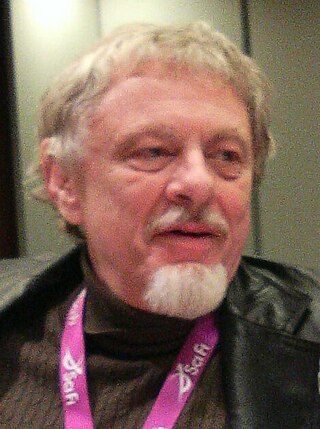
Norman Richard Spinrad is an American science fiction author, essayist, and critic. His fiction has won the Prix Apollo and been nominated for numerous awards, including the Hugo Award and multiple Nebula Awards.
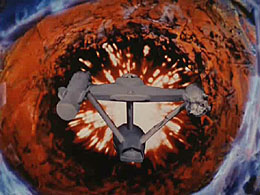
"The Doomsday Machine" is the sixth episode of the second season of the American science fiction television series Star Trek. Written by Norman Spinrad and directed by Marc Daniels, it was first broadcast on October 20, 1967.
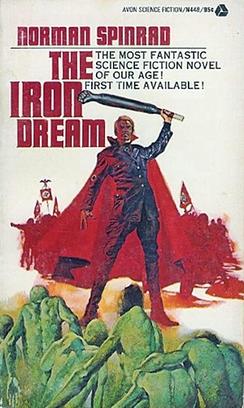
The Iron Dream is a metafictional 1972 alternate history novel by American author Norman Spinrad. The book has a nested narrative that tells a story within a story. On the surface, the novel presents a post-apocalyptic adventure tale entitled Lord of the Swastika, written by an alternate-history Adolf Hitler shortly before his death in 1953. In this timeline, Hitler emigrated from Germany to the United States in 1919 after the Great War, and used his modest artistic skills to become first a pulp–science fiction illustrator and later a successful writer, telling lurid, purple-prosed, pro-fascism stories under a thin science fiction veneer. The nested narrative is followed by a faux scholarly analysis by a fictional literary critic, Homer Whipple, which is said to have been written in 1959.
Rubber science is a science fiction term describing a quasi-scientific explanation for an aspect of a science fiction setting. Rubber science explanations are fictional but convincing enough to avoid upsetting the suspension of disbelief. Rubber science is a feature of most genres of science fiction, with the exception of hard science fiction.
Heldon was a French electronic rock band originally active between 1974 and 1978, and led by guitarist Richard Pinhas. Other members included synthesizer player Patrick Gauthier and drummer François Auger. The name of the band was taken from the 1972 novel The Iron Dream by Norman Spinrad.

In science fiction and fantasy literatures, the term insectoid ("insect-like") denotes any fantastical fictional creature sharing physical or other traits with ordinary insects. Most frequently, insect-like or spider-like extraterrestrial life forms is meant; in such cases convergent evolution may presumably be responsible for the existence of such creatures. Occasionally, an earth-bound setting — such as in the film The Fly (1958), in which a scientist is accidentally transformed into a grotesque human–fly hybrid, or Kafka's famous novella The Metamorphosis (1915), which does not bother to explain how a man becomes an enormous insect — is the venue.

Son of Man is a science fiction novel by American writer Robert Silverberg, published in 1971. The book is about Clay, a 20th-century man, who travels billions of years into the future and meets humanity in its future forms. Some of the issues discussed in the book are sexuality, telepathic communication between people, physical prowess or frailty, division of humans by caste or ability, and the preservation of ancient wisdom, among other things.

The Collected Stories of Philip K. Dick is a collection of 118 science fiction stories by American writer Philip K. Dick. It was first published by Underwood-Miller in 1987 as a five volume set. See Philip K. Dick bibliography for information about the mass market reprints.
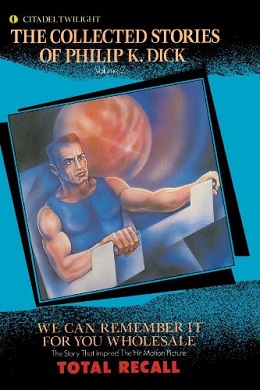
We Can Remember It for You Wholesale is a collection of science fiction stories by American writer Philip K. Dick. It was first published by Citadel Twilight in 1990 and reprints Volume II of The Collected Stories of Philip K. Dick replacing the story "Second Variety" with "We Can Remember It for You Wholesale". Many of the stories had originally appeared in the magazines Fantasy Fiction, Fantastic Universe, Fantasy and Science Fiction, Imagination, If, Amazing Stories, Science Fiction Quarterly, Startling Stories, Cosmos, Orbit, Astounding, and Planet Stories.

Supernovae have been featured in works of fiction. While a nova is strictly speaking a different type of astronomical event, science fiction writers often use the terms interchangeably and refer to stars "going nova" without further clarification; this can at least partially be explained by the earliest science fiction works featuring these phenomena predating the introduction of the term "supernova" as a separate class of event in 1934. Since these stellar explosions release enormous amounts of energy, some stories propose using them as a power source for extremely energy-intense processes, such as time travel in the Doctor Who serial The Three Doctors from 1972. For the same reason, inducing them is occasionally portrayed as a potential weapon, for instance in the 1966 novel The Solarians by Norman Spinrad.

Bug Jack Barron is a 1969 science fiction novel by American writer Norman Spinrad, first serialized in the New Worlds magazine under the editorship of Michael Moorcock. It was nominated for the 1970 Hugo Award. The novel is notable for its lyrical style and unique use of cut-up phrases. In this regard, Spinrad has cited the influence of Beat writers William S. Burroughs, Allen Ginsberg, and Jack Kerouac.

Child of Fortune is a 1985 science fiction novel by the American author Norman Spinrad. Like his previous book The Void Captain's Tale, Child of Fortune takes place three or four thousand years in the future in an era called the Second Starfaring Age. It is a coming of age story about a young girl's wanderjahr, a rite of passage that all adolescents in the Second Starfaring Age are expected to undertake before they become adults. Critical reaction to the book was mixed, with some critics dissatisfied with Spinrad's long ornate polyglot writing. Others were more positive, finding the difficult language worth the effort.
The Void Captain's Tale is a 1983 science fiction novel by the American author Norman Spinrad. The Void Captain's Tale takes place three or four thousand years in the future in an era called the Second Starfaring Age, a setting Spinrad revisited in the 1985 novel Child of Fortune. The book contains elements of confession, love story, eroticism, and horror.

Alpha 4 is a science fiction anthology edited by American writer Robert Silverberg, first published in 1973.

Nebula Awards 32 is an anthology of science fiction short works edited by Jack Dann. It was first published in hardcover and trade paperback by Harcourt Brace in April 1998.

Nebula Awards 20 is an anthology of award winning science fiction short works edited by George Zebrowski. It was first published in hardcover and trade paperback by Harcourt Brace Jovanovich in November 1985.

Nebula Winners Fourteen is an anthology of award winning science fiction short works edited by Frederik Pohl. It was first published in hardcover by Harper & Row in August 1980. The first British edition was published in hardcover by W. H. Allen in April 1981. Paperback editions followed from Star in the U.K. in March 1982 and Bantam Books in the U.S. in July 1982.
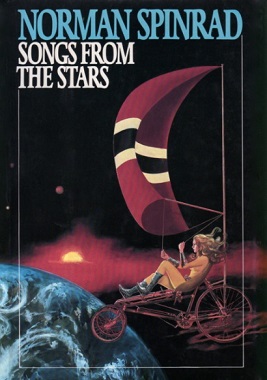
Songs from the Stars is a novel by Norman Spinrad published in 1980.

Wrack & Roll is a novel by Bradley Denton published in 1986.
















